Day 188 - The Economist - Weibo is in deep trouble
Foreign press read notes Day 188
The Economist - Weibo is in deep trouble
Wen / noknow

GUIDES
Note your eating guide
1⃣ the structure of the article in the notes, to approximate the background of the article to which the paragraph belongs;
2⃣ the original text, in the absence of a dictionary, read through the original text, master the general idea, and circle the birth word, the part in question to mark;
3⃣ the list word barrier against the carefully read notes, and focus on reading where there is doubt;
4⃣ the sameKey words - Good use of words, includingWriting Recommendations✏️ Words, Key Words👀 and Error-prone words ⚠️.、Words.As well as paragraph translation, re-reading the original text, clearing the barriers to understanding, and according to their own needs to take notes and imitation exercises.
5⃣, depending on the paragraphs of notes shared each day, sometimes involves sentence analysis of long, difficult sentences, which can be used as translation exercises.
6⃣️ More foreign press fine reading notes can be entered into the "small punch" - "three minutes cold foreign press fine reading" circleFree experienceView the . .

👇Share in the 188th reading notes section
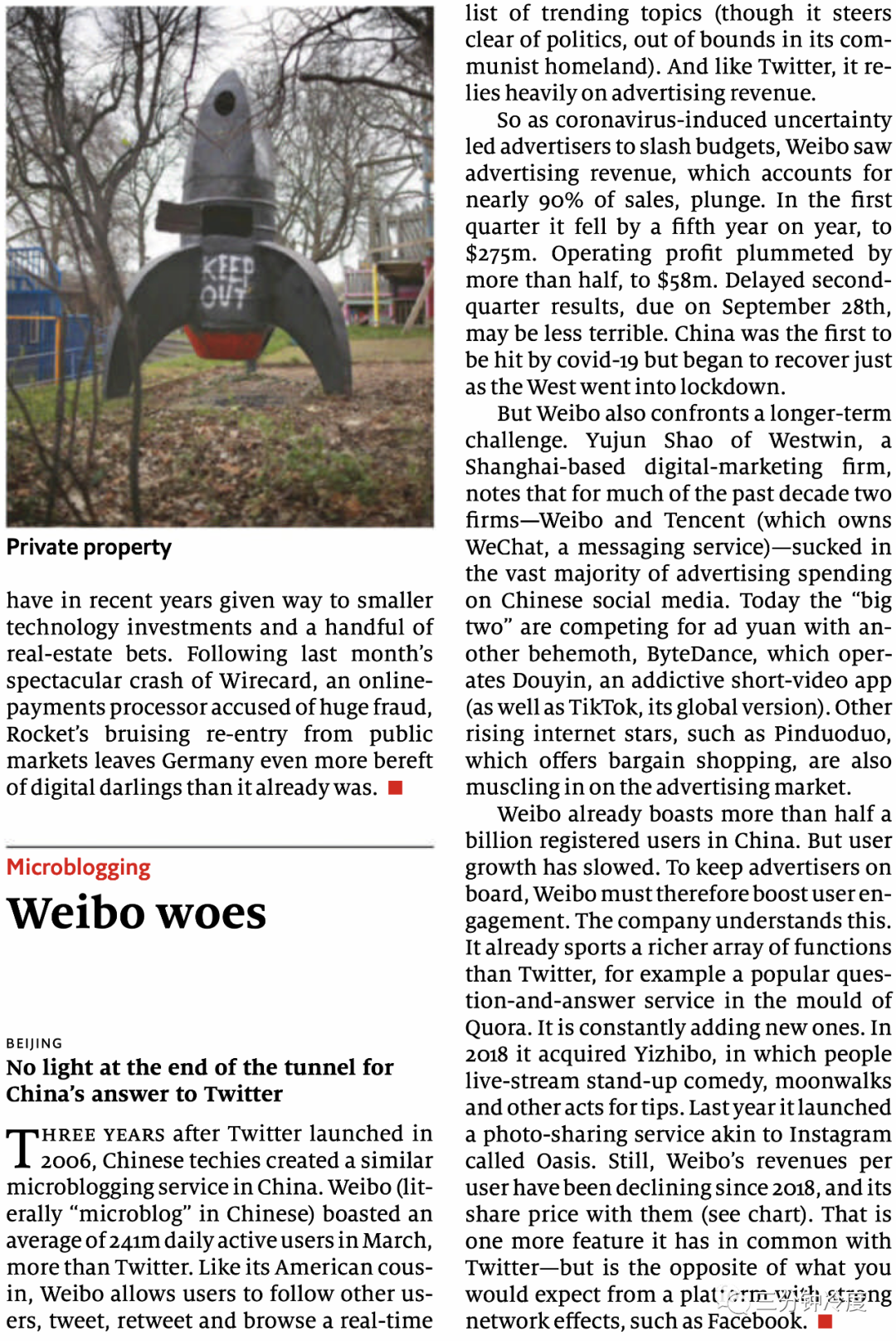
How to view the full version of the fine reading notes: click on the end of the text small punch program
How to get the original foreign publication: scan the end of the text QR code plus sister WeChat, free to share
The source of the article
📒 article source:
The EconomistIt is a magazine published by The Economist Newspapers Limited, founded in September 1843 by founder James Wilson.
Most of the magazine's articles are witty, humorous, strong, serious and witty, and focus on how to tell readers the most information in the smallest space.
The Economist, as one of the important sources of English-language questions, has a high degree of re-matching of words with English-language words. The long difficult sentences in the magazine and their composition structure are worth learning.
📒 article title:
Weibo woes
Weibo is in deep trouble
📒 summary of the article:
The article, selected from The Economist, is about the dilemma facing Weibo. In order to become the Chinese version of Twitter's micro-blog is really as dependent on advertising revenue as Twitter, the emergence of the outbreak has 100,000 ads, which is the biggest challenge facing microblogging. But Weibo also faces a long-term challenge, namely, the rise of companies such as Byte Bounce, which has challenged the dominance of Weibo and Tencent in the social media advertising market.
Article 400 words or so, relatively short, there are no new words, but there are many good to use expression, recommended reading and accumulation
What I'm sharing today is the first paragraph of this article 1⃣
The structure of the article is combed
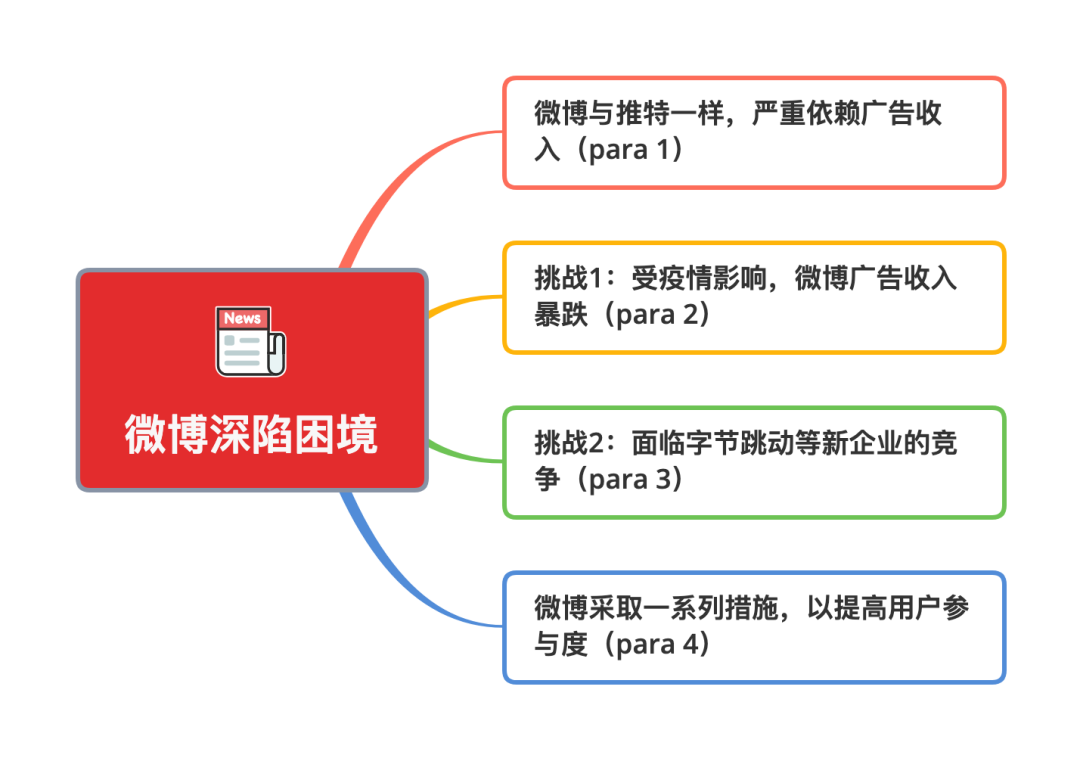
Original (para 1)
THREE YEARS after Twitter launched in 2006, Chinese techies created a similar microblogging service in China. Weibo (literally “microblog” in Chinese) boasted an average of 241m daily active users in March, more than Twitter. Like its American cousin, Weibo allows users to follow other users, tweet, retweet and browse a real-time list of trending topics (though it steers clear of politics, out of bounds in its communist homeland). And like Twitter, it relies heavily on advertising revenue.
Read Notes (para 1)
The first sentence of the first paragraph
THREE YEARS after Twitter launched in 2006, Chinese techies created a similar microblogging service in China.
Three years after Twitter launched in 2006, Chinese tech talent has created a similar microblogging service in China.
📖 techie
n. someone who knows a lot about computers or other electronic equipment Technical personnel; science and technology fans; (especially) computer pass, computer fans
The second sentence of the first paragraph
Weibo (literally “microblog” in Chinese) boasted an average of 241m daily active users in March, more than Twitter.
In March, Weibo, the literal Chinese meaning of "micro-blog", claimed an average of 241 million daily users, surpassing Twitter.
📖 boast (writing recommendation✏️)
vt. if a place, object, or organization boasts something, it has something that is very good (Places, institutions, etc.) proud to have (good things),eg: The city boasts two excellent museums. The city prides itself on having two excellent museums.
boast还可以表示:to talk too proudly about your abilities, achievements, or possessions boasting, boasting, boasting。 It can be used as both a verb and a object verb, boast (about/of) sth brags about something,eg: sth amy boasted that son was a genius. Amy boasted that her son was a genius. / he's boasting about how much money he has made. He is bragging about how much money he has earned. / the company is inclined to boast of its success. The company likes to show off its achievements.
The first paragraph is three sentences
Like its American cousin, Weibo allows users to follow other users, tweet, retweet and browse a real-time list of trending topics (though it steers clear of politics, out of bounds in its communist homeland).
It's the same kind of software in the U.S. Weibo allows users to follow other users, post tweets, retweet tweets and browse live leaderboards of popular topics (though it avoids banned politics in China).
📖 cousin (key word 👀)
n. something that has the same origins as something else Ants, similar things
In addition to referring to what we know as "cousins, cousins", this kind of thing can also be used to refer toother things such as plants and animalsFor example, when the outbreak first occurred this year, the introduction of the new coronavirus was usually a cousin of SARS.eg: The Alaskan brown bear is a close cousin of the grizzly bear. The Alaskan brown bear is a close relative of the grizzly bear.
📖 tweet
v. to publish a short remark or piece of information on Twitter Post information on Twitter,eg: He tweeted that he was just about to meet the president. He tweeted that he was about to meet the president.
📖 browse
vt. to look at information on the internet Browse (Internet);。eg:to browse the web to browse the World Wide Web
📖 steer clear of sb/sth
to avoid someone or something that seems unpleasant, dangerous, or likely to cause problems To avoid (unpleasant or dangerous people or things),eg: Her speech steered clear of the issues. Her speech avoided controversial issues.
📖 out of bounds
If an area is out of bounds, people are not allowed to go there.(Somewhere) it is forbidden to enter
The first paragraph is four sentences
And like Twitter, it relies heavily on advertising revenue.
And, like Twitter, microblogging relies heavily on advertising revenue.
Full translation
THREE YEARS after Twitter launched in 2006, Chinese techies created a similar microblogging service in China. Weibo (literally “microblog” in Chinese) boasted an average of 241m daily active users in March, more than Twitter. Like its American cousin, Weibo allows users to follow other users, tweet, retweet and browse a real-time list of trending topics (though it steers clear of politics, out of bounds in its communist homeland). And like Twitter, it relies heavily on advertising revenue.
Three years after Twitter launched in 2006, Chinese tech talent has created a similar microblogging service in China. In March, Weibo, the literal Chinese meaning of "micro-blog", claimed an average of 241 million daily users, surpassing Twitter. It's the same kind of software in the U.S. Weibo allows users to follow other users, post tweets, retweet tweets and browse live leaderboards of popular topics (though it avoids banned politics in China). And, like Twitter, microblogging relies heavily on advertising revenue.
More examples of foreign publications are available 👇
Swipe to see more
1. The structure of the article, the question of 👉 Clear up the structural problems
2. Full-text translation 👉Overcome the translation problem
3. Error-prone, key word combing 👉 Solve word problems
4. Synonyms are 👉 Pack words, scientific memory
5. Long difficult sentences (including detailed analysis) 👉 Clear grammatical barriers
Click on "Little Punch"Free experienceView the full edition of the foreign edition of the fine reading example
Small punching program 👇
Want to sign up or have any questions are welcome to add sister WeChat, to learn more about oh 👇

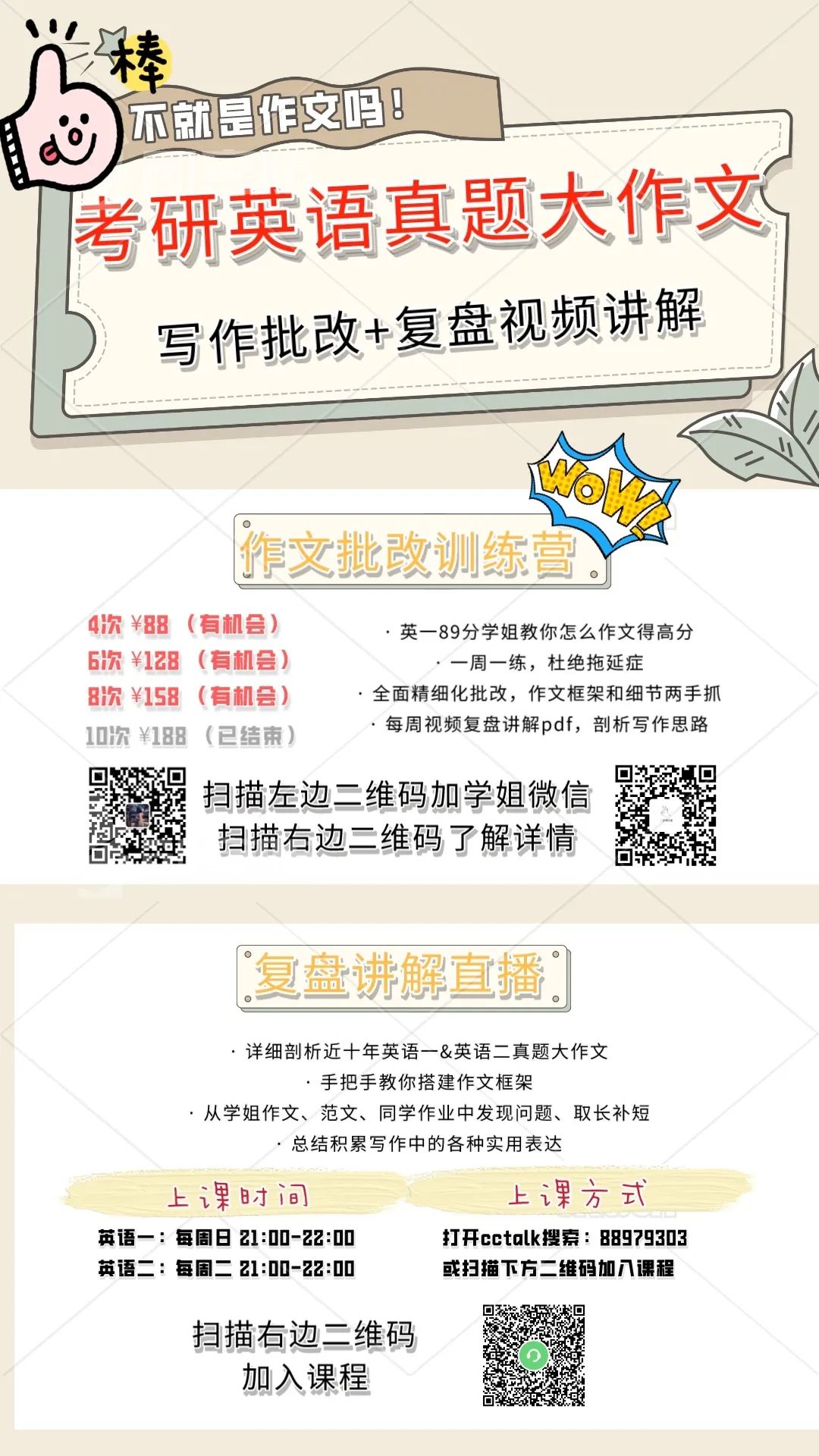


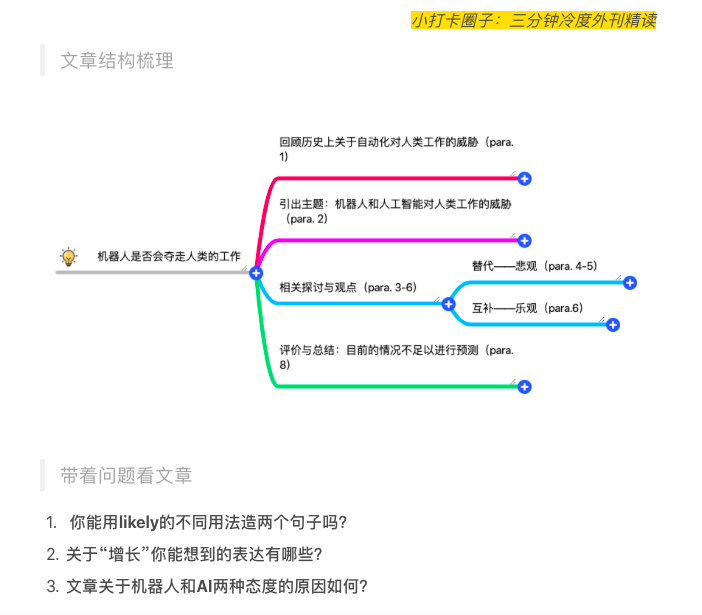
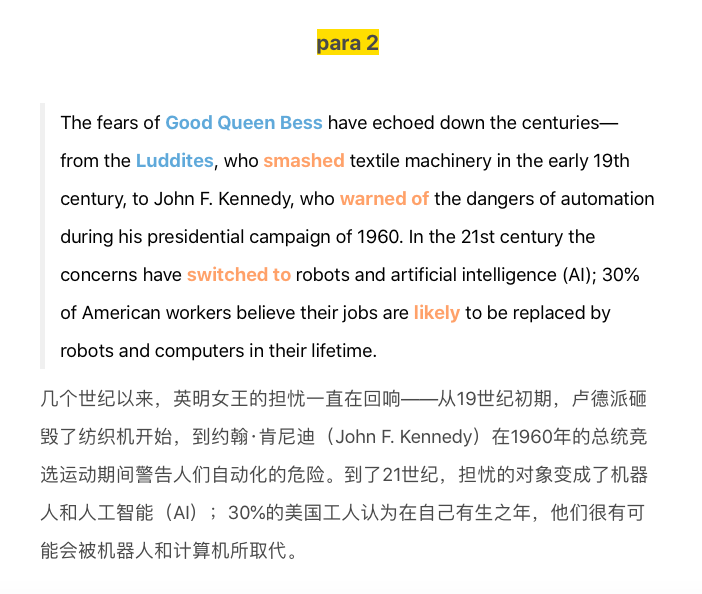
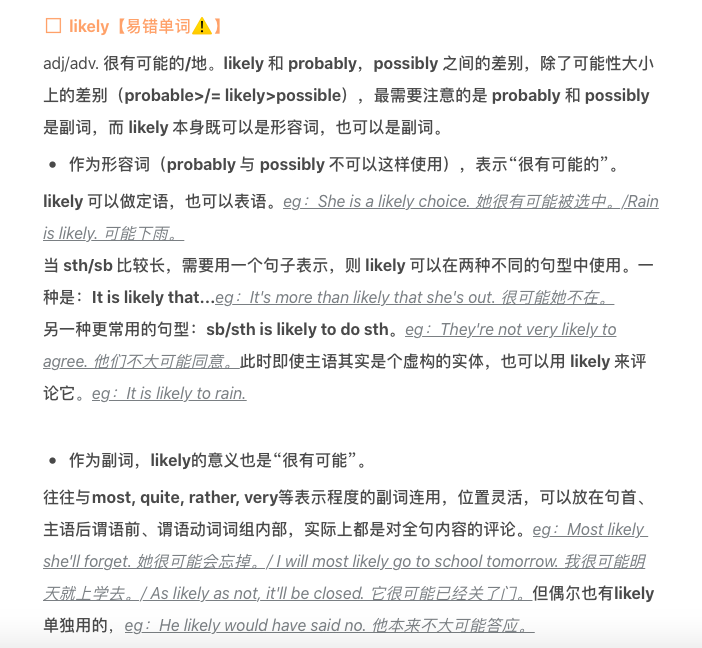
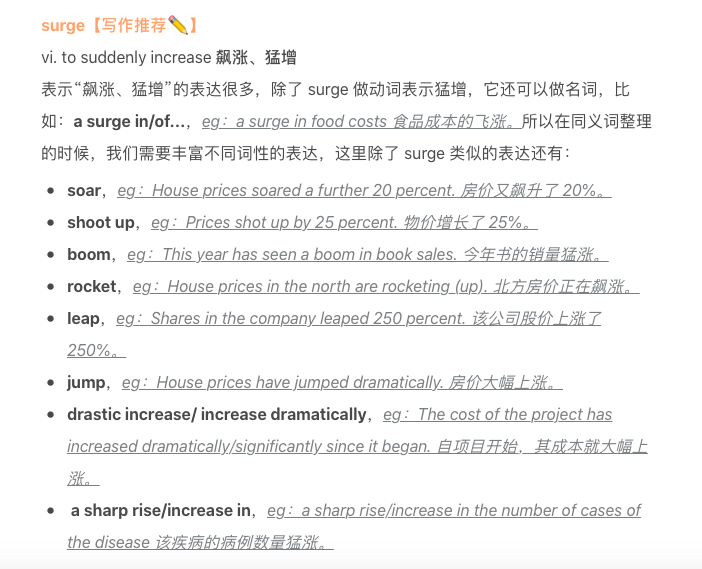
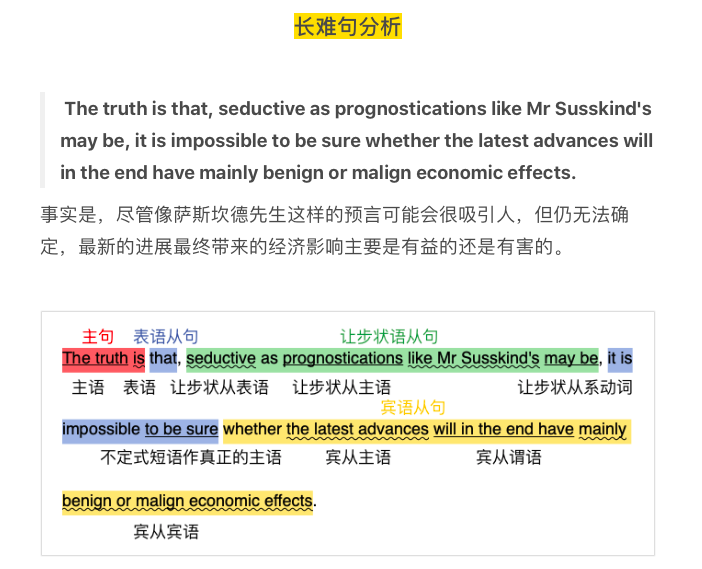
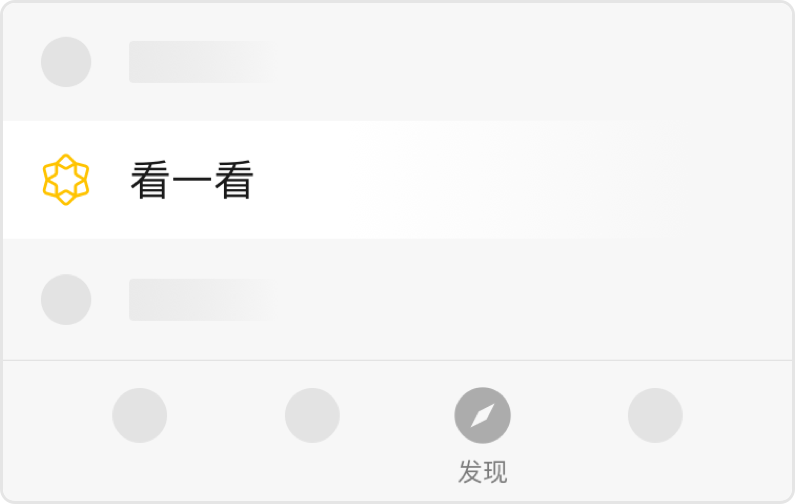
Send to the author